| Article ID | Journal | Published Year | Pages | File Type |
|---|---|---|---|---|
| 2087254 | Innovative Food Science & Emerging Technologies | 2007 | 6 Pages |
The suitability of probiotic cultures as fruit juice supplements was examined by assessing their acid tolerance and technological robustness. Survival of Lactobacillus and Bifidobacterium strains in orange juice (OJ), pineapple juice (PJ) and cranberry juice (CJ) was monitored. Results revealed that extensive differences exist among probiotic strains regarding their acid resistance. All of the strains screened survived for longer in OJ and PJ compared to CJ. L. casei DN-114 001, L. rhamnosus GG and L. paracasei NFBC43338 displayed the greatest robustness surviving at levels above 107 cfu ml− 1 in OJ and above 106 cfu ml− 1 in PJ for at least 12 weeks. Probiotic tolerance to thermal and non-thermal processing was studied to determine the feasibility of their addition to OJ prior to pasteurisation. OJ fortified with probiotic cultures was subjected thermal pasteurisation at 76 °C for 30 s and 90 °C for 1 min in addition to a high pressure treatment of 400 MPa for 5 min. Results indicated no strain was capable of withstanding treatments necessary to achieve a stable juice at levels > 106 cfu ml− 1. The outcome of the overall study points to L. rhamnosus GG, L. casei DN-114 001 and L. paracasei NFBC43338 as having promising potential for exploitation as functional supplements in fruit juices due to their impressive tolerance in acidic environments; however, fortification post processing is recommended.Industrial relevanceThe ability of health-promoting cultures to survive for at least 12 weeks in orange juice and pineapple juice at commercially critical levels renders them suitable strains for exploitation. Their inclusion may enhance the market potential of these already successful beverages.
